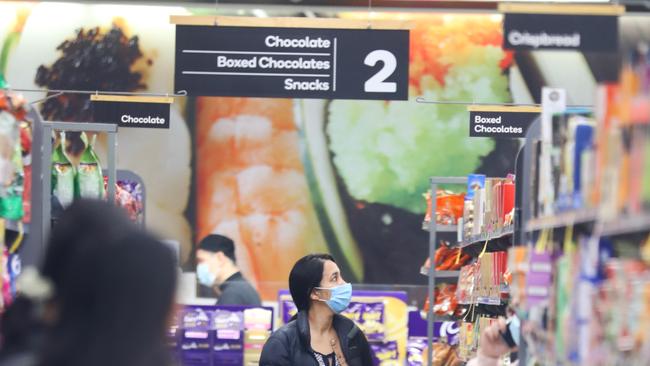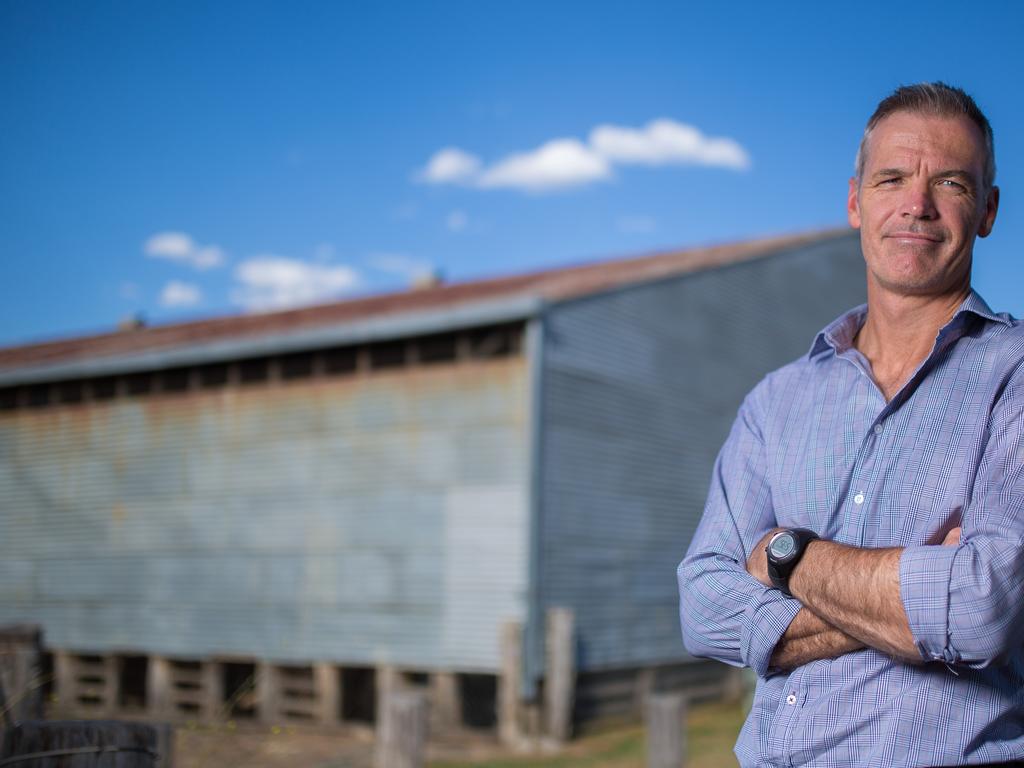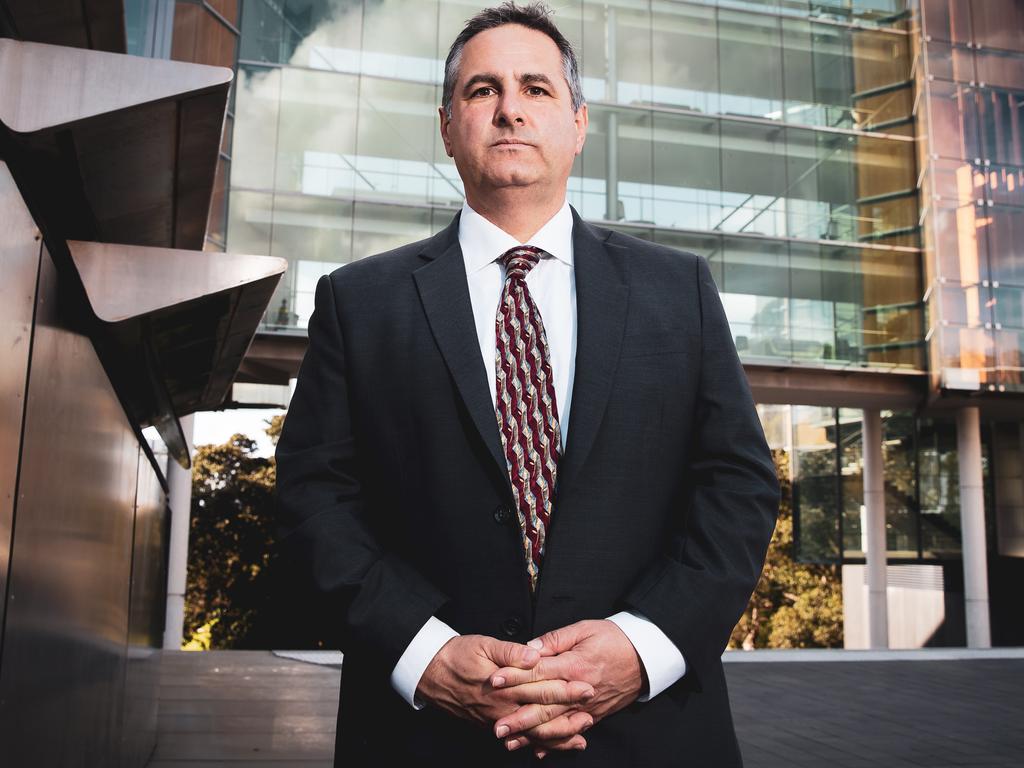Woolworths wants lockdown ‘certainty’ from Victorian government
Woolworths wants clarity on how Victoria’s lockdown will hit its supply chain, as one of CEO Brad Banducci’s daughters tests positive for COVID-19.

Supermarket major Woolworths is seeking further details from the Victorian government around how the tougher lockdown would apply to its supply chain given the closure of some manufacturing and the forced slowdown of the meat industry and deliveries is threatening to cause disruption.
The comments came as the Woolworths chief executive Brad Banducci revealed the personal cost of the pandemic, revealing late Tuesday that one of his daughters had tested positive for COVID-19.
“These are challenging times in Victoria, and as a father with two daughters currently studying and working in Melbourne, I feel it personally. In addition, one of my daughters (working in health care), has also just tested positive for COVID making it even more real for us as a family,” Mr Banducci said in a mail-out to customers.
He said the supermarket operator was seeking clarification from the Victorian government over its planned stage 4 lockdown rules, which require a sharp reduction in output across the state’s meat industry from Friday, while noting the closure of manufacturing could also hit its other suppliers.
“We are engaging with the government as I write to seek further clarification on these changes, and are working with our suppliers and doing all we can to minimise any disruption to the supply of meat and other products in our stores and online,” he said,
Earlier Tuesday some of Australia’s biggest employers, many with a high share of stores in Victoria, such as JB Hi-Fi, The Good Guys, Harvey Norman, Myer, David Jones, Big W and Super Retail warned customers to brace for a partial or complete closure of their networks, although some would keep their digital channels open for delivery or click & collect.
Wesfarmers chief executive Rob Scott urged the Andrews government to refine and possibly widen the types of businesses, particularly retail, that can operate under the strict stage 4 lockdown restrictions that have swept across metropolitan Melbourne.
With stage 4 restrictions on work, movement and business activity across the city to apply from midnight, winners and losers are already emerging as those retailers nimble in the new economy can leverage their websites to divert customer traffic to online shopping and click & collect.
Supermarkets and food retailers can remain open, but a host of retailers in general merchandise, consumer electronics, fashion and apparel, furniture and housewares are facing a six weeks of enforced hibernation.
The Australian Retailers Association is in close contact with the federal government, with its chief executive Paul Zahra, who is the former boss of David Jones, saying it was hard to know where the crisis would land and the support needed for the retail sector beyond JobKeeper.
Many national retailers are not eligible for JobKeeper, with a gap opening up that hundreds of thousands of stood down retail workers could fall into.
Mr Scott, whose Perth-based conglomerate is facing tougher restrictions at his Bunnings stores that can remain open and complete closures for Target, Kmart and Officeworks, has called on the state government to refine some of the regulations around openings, saying he was worried about the massive loss of jobs as hundreds of thousands of Victorians are sent home from work.
“I accept that the government has worked around the clock to try come up with a set of rules, we have learnt a lot from the New Zealand shutdown, and what we learnt is that as people are confined at home for many weeks … that there are certain products particularly those you need to use around the house, to school your kids from home, to entertain your kids, that are going to be in very strong demand, so there are ways in which we have proven we can operate safely,’’ Mr Scott told ABC Radio.
“There is an opportunity in a very measured risk-based way that we review this over coming weeks, as the New Zealand government did as they worked through their lockdown.
“I would like to call out that I am very pleased the government has recognised the importance of online and contactless click & collect … but the reality is that doesn’t work for all households, so I think there is an opportunity to refine the processes,’’ he said.
Woolworths confirmed that its 22 Big W stores in metropolitan Melbourne will be closed for six weeks under stage 4 restrictions, while nine Big W stores in regional Victoria will remain open for customers under stage 3 restrictions.
Outside of Victoria, the remaining 148 Big W stores continue to trade as normal.
Of Woolworths’ ALH pubs in Victoria, around 80 will close, further damaging the profitability of the pubs arm that before COVID-19 was being prepared for a possible demerger and a sharemarket float.
Ian Bailey, the boss of Kmart and Target, who is preparing to close 73 of his general merchandise stores, said he was unsure how many of his 15,000 workers in the state he could keep on to fulfil online orders and how many would be sent home.
Drive up, click & collect
“We will have drive up and click & collect in every store and I guess we will see what happens with customers and how much they will take it up, and that will determine how many people we need,’’ Mr Bailey said.
“So at the moment I really have very little to predict what it will mean for our team because we just don’t know how demand will play out. In New Zealand we saw quite considerable demand for online when we were in lockdown.’’
Up-market department store David Jones and its Country Road Group, taking in Country Road, Politix, Witchery and Trenery, is closing all its retail stores in Victoria to meet stage 4 lockdown regulations. However, it has stopped short of offering click & collect as the traffic of customers coming in and out of stores could inadvertently spread COVID-19
“Our click & collect services will be suspended throughout Victoria at this time. In recent months we have continued to optimise our online offering and support services, and will maintain this focus throughout the store closure period to best support the needs of our customers,’’ a David Jones spokesman said.
JB Hi-Fi said 46 JB Hi-Fi stores and 21 Good Guys stores located within metropolitan Melbourne would be closed to customers from Wednesday night for a minimum six weeks.
“Based on Victorian government directions, our online and commercial operations will continue to trade and be available to meet the needs of our customers with fulfilment by home delivery and contactless click & collect,” JB Hi-Fi said.
Supporting existing and expecting parents
Baby Bunting is one of the few non-food retailers to remain open, as it is in the maternity category, and chief executive Matt Spencer told The Australian the retailer would be supporting existing and expecting parents.
“I think there will be around 9000 births that will occur during this (six week) period and those new parents will need the support that maternity retailers can provide,’’ he said.
JPMorgan analyst Shaun Cousins said food retailers remained best positioned with a sales boost expected initially due to panic buying, but also due to consumers eating mostly at home for the next six weeks.
Mr Cousins said JB Hi-Fi and Officeworks had the among the highest share of their stores network in Victoria, with their earnings most at risk.
“Officeworks and JB Hi-Fi have a higher share of stores in Victoria versus its population share — Officeworks 31 per cent of stores, and JB Hi-Fi Australia and The Good Guys (also owned by JB Hi-Fi) both 27 per cent of stores.
JPMorgan warned the introduction of stage 4 lockdown restrictions could shock the consumer into action.
“While the savings rate has increased arguably into the teens, the Australian consumer has adopted somewhat of a lax rather than concerned approach to the impact of COVID-19 now and into the future.
“The shock of stage 4 restrictions in Melbourne could see a change in consumer behaviour, as the vulnerability of communities to COVID-19 becomes more apparent and the longer-term impacts on the economy become more evident.”
Westpac senior economist Matthew Hassan warned sharp declines in consumer spending were now in the pipeline
“(Retail sales) are set to show a much bigger fall with more pronounced weakness in non-retail segments like accommodation, recreational services, tourism, travel, fuel and vehicles sales — the latter alone known to be down 25 per cent in the quarter.
“A return to ‘business as usual’ — whatever that may look like post-COVID — is still clearly a long way off.”








To join the conversation, please log in. Don't have an account? Register
Join the conversation, you are commenting as Logout